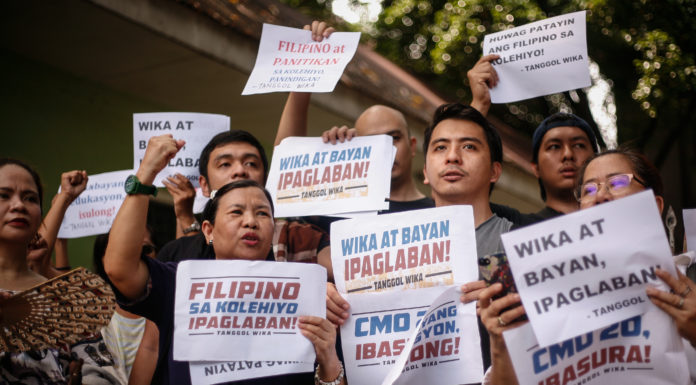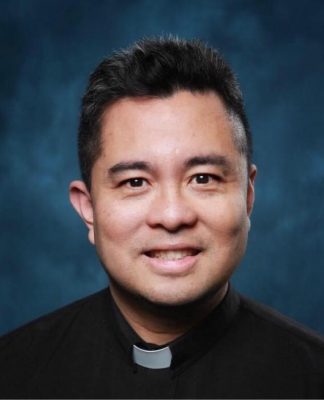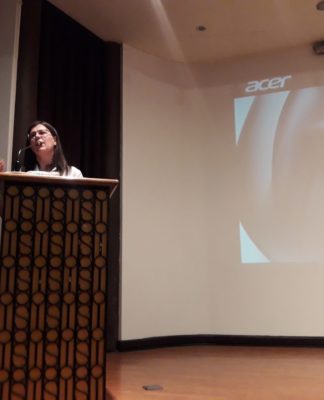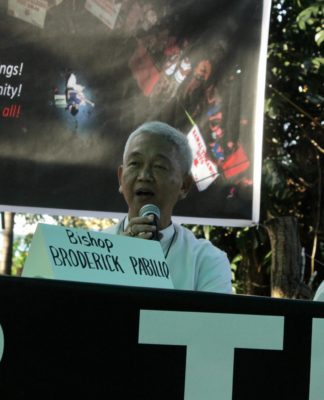A YEAR before the nation marks the 40th anniversary of the declaration of martial law on September 21, 1971, the Philippines has the enviable record of being both a wild democracy and a police state. As a democracy, it has become more and more a vacuous one; as a police state, the reality has become even more pronounced. Ferdinand Marcos may be gone and his generals have all been retired or buried, but their legacy has proved lasting. The Philippines is a national security state.
Consider: the proposed mandatory registration of SIM cards; the constant call from state agencies for a national ID system; the installation of CCTV cameras in public and private institutions (in UST, all classrooms covering more than 40,000 students have spy cameras! Do they have CCTV’s in the classrooms of the Central Seminary, too?); drug-testing by the state of citizens and on campus, mandatory drug testing of students; the mulled issuance of guns to MMDA enforcers; the untrammelled traffic in guns, the ubiquitous and arrogant pro-gun car stickers, and even gun-maniacal President Aquino calling on prosecutors to carry guns so they can protect themselves and even bragging he could teach them how to shoot; the pervasive presence of PNP checkpoints around Metro Manila and beyond; and even the obligatory frisking in every MRT/LRT terminal station and all shopping malls nationwide!
At a glance, these steps seem to promote security. But consider: the Chinese are pooh-poohing Philippine sovereignty over the Spratlys. Civil defense has been caught wanting because of Pagasa’s hopeless weather forecasting while the military does not have enough rubber-boats to save flood victims in a country geographically fated to be always flooded. And amid the exponential growth of the budgets of the military and police, we see the exponential growth too of the communist and other insurgencies as well as the exponential growth of criminality!
Consider too the dramatic growth of blue guards nationwide through the years. Now, there are more security guards than the armed forces and the police combined!
We are certain that with or without six degrees of separation, you, reader, have had kin and friends, or their kin and friends, reporting almost weekly that they have been victimized by criminals and syndicates. Crime is a daily currency in security-crazy Philippines.
In the run-up to and the aftermath of the 10th anniversary of 9/11, shopping malls and other public places with heavy concentration of people have become checkpoints. This is not new since frisking and checkpoints have become a staple in mall-crazy Philippines for a generation now. The Philippines is the only country in Southeast Asia where frisking in malls and other places is obligatory! Could there by a more flagrant sign that the Philippines remains essentially under martial law more than 25 years after Edsa?
Last September 14, a woman shot her philandering husband and a security guard at SM North Edsa. How a gun fell into the possession of an ordinary civilian who was able to bring it inside the mall, whose entry points were heavily manned by security guards, should show the macro and micro failures of the nation-state: macro, because the state is a joke at controlling guns and ordnance; and micro, because private businesses, large or small, must secure their businesses and properties by contracting security services owned and run by retired military and police officers, who, incidentally, had been ignominious failures at civil defense and public safety, but who nevertheless got rewarded by the nation-state generous pensions (Major-General Carlos Garcia retired from the service and got all his benefits despite all of the grave corruption cases against him), earning the wherewithal to put up their own security businesses and thus cashing in on the insecurity that they had fostered by their incompetence or corruption, or both!
Security therefore has become big business. We are sure that UST purchased the CCTV’s it installed campus-wide from a supplier-firm owned by a retired military or police officer!
All of this vicious cycle has produced the reality of the Philippines as a barracks state and a banana republic.
Who could forget the12-hour-long hostage crisis in Luneta last year which ended in a bloodbath when eight Hong Kong nationals died in the hands of a former senior police inspector and indirectly in the hands of the Keystone cops of the Philippine National Police?
Even the mandatory drug test is a red alert sign of the state’s inefficiency to combat the illegal trade. Since the pushers can’t be caught, and since even if caught, they can buy their way out of a corrupt criminal justice system, the state turns its ire on users and on most ordinary citizens who don’t take drugs. Civilians are subjected to the harsh glare of suspicion.
And who pays for the drug test? Despite the law saying that the mandatory drug test is free, we all know who pays for it—we, the taxpayer! And we the taxpayers are the suspects. Why should tax-paying citizens be put to blame for the state’s shortcomings?
National security ideology
If the state’s reason for being is providing defense and security to the nation, then it should be abolished, since its biggest shortcoming is failing to end the communist insurgency and Muslim secessionism. Both conflicts are nearly two generations old, but no end in either is yet in sight!
The last time, we heard, Senator Trillanes and other factions in the military were accusing one another of selling arms to the insurgents and the Muslim rebels! No wonder these conflicts can’t be ended—the military and the insurgents and secessionists have found an excuse to prolong the conflicts so as to cash in on them, perhaps permanently.
For the military and their communist foes, it has been a marriage of convenience for fascists of the right and fascists of the left. Senator Angara said the armed forces have to explain where the big amounts of money and resources poured into the war against the communists and Muslim rebels year in and year out have gone, but no independent audit has been made.
Moreover, the big camps in Metro Manila, such as Fort Bonifacio and Villamor Air Base, have been sold to developers so as to raise money for the modernization of the AFP. This was supposedly the plan more than 20 years ago when China started to encroach in the Spratlys. Early this year, China again started flexing its muscle in the disputed group of atolls and islets, and the Philippines has been caught a sitting duck. Where did the money for AFP modernization go?
So after selling Fort Bonifacio to glossy developers and Villamor Air Base to Resorts World and the casinos, do we have the money for military modernization? Is the nation any more secure? Or have we just pampered further the security forces and rewarded them for the umpteenth time for their incompetence, corruption, and sheer mercenary attitude?
But the national security mentality just keeps on growing. The Reproductive Health bill is an instance of this. In the national security ideology, everything is a security concern: family size and demographics must become population control and social engineering; rice sufficiency is a matter of “food security.” Even the environment and climate change are security concerns.
But look closer: the RH bill is nothing but an attempt to resurrect the population control policy of Marcos and martial law, during which family planning was enshrined in the 1973 Constitution, an authoritarian charter. The liberals and leftists who cantankerously lobby for RH lobby for no less than the return of martial law. Fascism is alive in the liberal right and the communist left, strange bedfellows who find themselves embracing one another—all in the name of population control and national security.
















